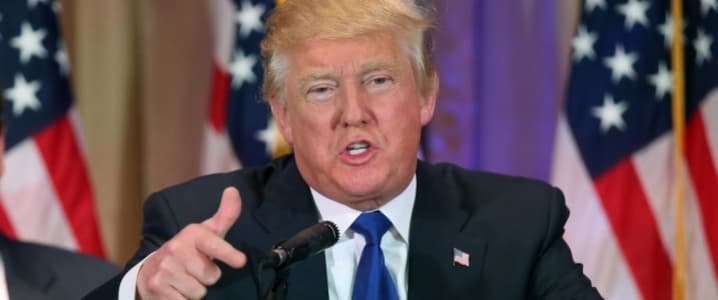U.S. President Donald Trump flirted with raising the federal gasoline tax this week, raising eyebrows by showing an openness to tackle a problem that has scared away politicians from both parties for years.
Everyone seems to want to fix, rebuild or build new infrastructure in the United States. Politicians often make large infrastructure promises, framed the issue as a way to both boost the economy and create jobs. But building roads, bridges, dams, ports and the like requires money, something that has been increasingly scarce in recent years.
The funding stream for infrastructure comes largely from the Highway Trust Fund, which receives money from federal fuel taxes. Those taxes have been stuck 18.4 cents per gallon for gasoline and 24.4 cents per gallon for diesel since 1993. But infrastructure needs have exploded over the past quarter century while the revenue mechanism has remained unchanged, putting an ever-growing strain on the budget for new projects. Inflation has eroded the value of the tax over time, while construction costs have climbed.
The inadequacy of the gasoline tax is especially true because gasoline demand has remained flat for a decade, save for the one-off bump over the past few years because of the crash in oil prices. Not only did the long-term rise in vehicle-miles traveled slow down after the 2008 financial crisis, but the vehicle fleet has become more efficient over time. Hybrid and electric vehicles promise to cut into gasoline demand in the years ahead as well, taking a deeper bite out of the Highway Trust Fund. The Congressional Budget Office projects the Highway Trust Fund will run out of money in 2021. Related: The Inconvenient Truth About Electric Vehicles
The obvious answer is to hike the gas tax, but it has been a political hot potato. The U.S. Congress has not dared raise the subject, fearing a voter backlash.
President Trump, in characteristic fashion, eschewed conventional political wisdom and said in a recent Bloomberg interview that he would be willing to raise the fuel tax as part of a broader tax overhaul. “It’s something that I would certainly consider,” Trump said, arguing that people would support it “if we earmarked money toward the highways.”
Still, despite what seems to be a surprising open-mindedness about raising the gasoline tax, the White House Press Secretary quickly walked back the President’s comments on Monday, arguing that Trump was not specifically supporting an increase. And with Republicans in Congress wary of such a move, it’s safe to assume the federal gasoline tax will remain unchanged for years to come.
Despite the lack of action at the federal level, states are moving ahead aggressively – and not just in states controlled by Democrats. Below are a few examples, according to the National Conference of State Legislatures, of recent increases in state gasoline taxes, which have been implemented even by some deeply conservative states:
• Fuel tax increase in 2013: Maryland, Massachusetts, Pennsylvania, Vermont, Virginia, Wyoming and the District of Colombia.
• Fuel tax increase in 2014: Michigan, New Hampshire, Rhode Island.
• Fuel tax increase in 2015: Georgia, Idaho, Iowa, Michigan, Nebraska, South Dakota, Utah and Washington. Kentucky and North Carolina changed the tax formula to limit the decline in revenues.
• Fuel tax increase in 2016: New Jersey.
The tax increases have continued into this year. Tennessee’s Republican Governor just signed a bill to hike his state’s gas tax by 6 cents per gallon. Indiana’s Republican Governor also put his signature on a 10-cent per gallon increase last month.
The big one is California, which is number 1 for registered vehicles at 26.3 million, or more than 10 percent of all vehicles in the country. California’s Governor recently signed a bill that will increase the gasoline tax by 12 cents per gallon.
More are forthcoming. Montana is nearing passage of an increase and Utah is changing its tax formula, which will likely amount to an increase, as well.
Even Oklahoma, Alaska, and Louisiana – deep red states where the oil and gas industry looms larger than life – are mulling tax increases.
All in all, despite (or because of) Washington’s failure to act, there is a ton of action happening at the state level. Related: French Oil Giant Total Earning Like its 2014
Higher taxes, which will come on top of higher crude oil prices over the past six months, could put a dent into motorists’ appetite for fuel. However, in most cases, the tax increases are not expected to seriously curtail oil demand. "Most of the gas tax increases being talked about are fairly small, 5 to 10 cents, not large enough to meaningfully cut back on fossil fuel consumption," Carl Davis, research director at the left-leaning Institute on Taxation and Economic Policy, told E&E News in April. "They're trying to get everybody to chip in, to fund the state's infrastructure."
By Nick Cunningham of Oilprice.com



















fix the situation any time soon. The U.S. needs to spend 4 to 5 trillion over the next 10 years to really fix the problem. 20 trillion in debt and almost nothing to show for it, stupid politicians.
https://www.nsf.gov/discoveries/disc_summ.jsp?cntn_id=131175